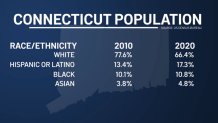U.S. Census Bureau data shows that Connecticut has not only grown more diverse over the last decade but it has added 31,847 residents.
“There is an increase in the number of Latinos, the number of African-Americans and the number of Asians, so we’re seeing a shift nationwide that is also reflected in the state of Connecticut,” Rep. Tammy Exum, D-West Hartford, said.
Exum is a member of the redistricting committee, which will use the Census data to redraw Connecticut's political lines.
“Hopefully we will start seeing more representation within our chamber that looks like our communities,” Exum said.
Get Connecticut local news, weather forecasts and entertainment stories to your inbox. Sign up for NBC Connecticut newsletters.
Data released by the census showed that Connecticut's white population dropped from 77.6% in 2010 to 66.4% in 2020, while the Hispanic or Latino population grew from 13.4% to 17.3%. The Black population grew from 10.1% to 10.8% and the Asian population grew from 3.8% to 4.8%.

This was also the first year inmates will be counted in the communities they came from and not the community where the prison is located.
Local
“Representation is very important. We know that gerrymandering had taken place for years in this country,” Sen. Doug McCrory, D-Hartford, said.
“When we do look at data, when we do look at drawing lines that has to be taken into consideration,“ McCrory says.
That means towns like Enfield, Suffield, Somers, Cheshire and Uncasville where there are large prisons will lose population and perhaps representation.
“Even though a person is sleeping in a location for a period of time. Their families, and their needs and their wants and interests is back home,” McCrory said.
It also means cities like Bridgeport, Hartford and New Haven will gain population.
“Whether they’re all in a city from where they come or a correctional facility it’s just going to make the lines move the way that they’re supposed to be,” Sen. Kevin Kelly, the Republican co-chair of the redistricting committee, said.
Kelly said the lines will be pushed one way or another based on the all the data.
“It’s a bipartisan process. We have to negotiate this. And I think it will make it as fair as possible,” Exum said.



